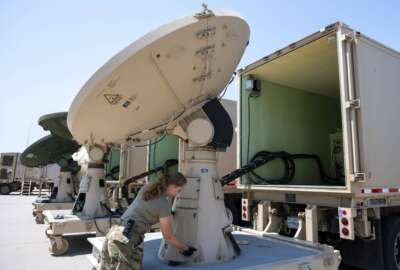
House Armed Services Committee endorses new management structure for Space Force
A Defense Department proposal — now agreed to by a key House subcommittee — outlines a change in personnel management for the Space Force that would eliminate...
While the Space Force moves a step closer to getting its own National Guard component, it may also soon adopt a new personnel management system unique to the service.
Language in the House’s version of the 2024 National Defense Authorization Act would create a management structure for both reserve and active duty Guardians that looks significantly different than the other services. In an effort to create more flexibility, both full and part-time service members would fall under the same management structure and part-time members would replace a formal reserve component.
The structure for the newly designed Space Force originated in a proposal from the Defense Department that said the service “shall be managed through a single military personnel management system, without component.”
Under that system, Guardians would be categorized as active status, inactive status and retired status. While those terms are used for other services, a new category of “sustained duty” would be added just for Guardians. Sustained duty is roughly equivalent to regular component duty where service members actively work full-time in military positions.
“Space Force officers with an obligation to serve on active duty will serve on sustained duty orders while fulfilling that obligation and may continue to serve on sustained duty once their service obligation has been fulfilled. Similarly, enlisted members who indicate in their enlistment agreement that they want to serve on active duty will be placed on sustained duty orders for the period of their agreement,” according to the DoD proposal.
The system creates flexibility for Guardians who want to move back and forth between full and part-time positions. The Department of the Air Force would set standards for how different positions would work. The House subcommittee language adds some specifics including minimum requirements for a Guardian to be considered active duty while only working part-time, including training and time spent on active duty. Instead of a separate Space Force reserve, Guardians would be in the same service but designated as full or part-time.
“Except as specifically provided in regulations prescribed by the secretary of Defense, a member of the Space Force in active status who is not serving on sustained duty shall be required to participate in at least 48 scheduled drills or training periods during each year and serve on active duty for not less than 14 days (exclusive of travel time) during each year; or serve on active duty for not more than 30 days during each year,” according to the House subcommittee version of the new management system in the proposed NDAA.
The Space Force would have the ability to call an active status Guardian into sustained duty in the same way other services activate reservists. Once on sustained duty, service members could also be moved back to inactive duty.
“Applicable provisions of law, pertaining to a member of the ready reserve when ordered to active duty shall apply to a member of the Space Force who is in a Space Force active status when ordered to active duty,” said the proposed NDAA.
The Space National Guard would come from transferring 1,000 Air National Guardsmen from 16 units across eight states and territories to the new component. The airmen in those positions are already working in space focused specialties.
Both the new personnel management system and the Space National Guard will need final approval from Congress. The House Armed Services Committee will vote on the proposals June 23. After that, the full House needs to approve the measures before the bill goes to conference committee reconciliation prior to becoming part of the final NDAA. While some lawmakers expressed concern about both the costs and necessity of a Space National Guard, there is support on both sides of the aisle.
“Creating a new military component is not something Congress does very quickly; it takes time and bipartisan support,” said retired Brig. Gen. Roy Robinson, president of the National Guard Association of the United States. “That’s why it’s so heartening to see that a broad coalition in both the House and Senate share our determination to establish a Space National Guard.”
Copyright © 2025 Federal News Network. All rights reserved. This website is not intended for users located within the European Economic Area.
Alexandra Lohr, a former staff member, covered the Defense Department for Federal News Network until September 2023.
Related Stories

While the White House doesn’t like the idea of a Space National Guard, one particular interest group does




